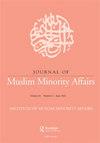“我不是你认为的我”:加拿大穆斯林青年在归属感和公民权谈判中的多重、混合和种族化身份
IF 0.4
0 RELIGION
引用次数: 0
摘要
摘要虽然其他研究探讨了西方穆斯林青年面临的挑战,但本研究关注的是在全球冲突、集体监视和怀疑的时代,加拿大穆斯林身份的挑战和发展。身份形成是复杂的,涉及许多影响的配置——直接和间接、局部和全局、个人和非个人。有时,流动性和多重身份的各个方面会发生冲突,个人面临着驾驭竞争性的、不一定是对等的影响。加拿大穆斯林青年CMY就是这样。对CMY的30次访谈进行主题分析,确定了五个主要主题:(a)多重、复杂和混合身份的导航;(b) 宗教身份和精神;(c) “我不是你想象中的我”——媒体对穆斯林的描述;(d) 在反穆斯林种族主义面前主张包容和归属;和(e)建议。倾听CMY的声音将有助于政策制定者、从业者、穆斯林社区和组织制定积极的青年发展战略。本文章由计算机程序翻译,如有差异,请以英文原文为准。
“I Am Not Who You Think I Am”: Multiple, Hybrid and Racialized Identities of Canadian Muslim Youth in the Negotiation of Belonging and Citizenship
Abstract While other studies explore the challenges faced by Western Muslim youth, this study focuses on the challenges and development of a meaningful stable Canadian-Muslim identity in an era of global conflicts, collective surveillance, and suspicion. Identity-formation is complex, involving the configuration of many influences—direct and indirect, local and global, personal and impersonal. Sometimes aspects of fluid, and multiple identities conflict and individuals are faced with navigating competing and not necessarily commensurable influences. Such is the case with the Canadian Muslim Youth—CMY. Thematic analysis of 30 interviews with CMY, identified five major themes: (a) Navigation of multiple, complex, and hybrid identities; (b) Religious identity and spirituality; (c) “I am not what you think I am”—Media portrayals of Muslims; (d) Claiming inclusion and belonging in the face of anti-Muslim racism; and (e) Recommendations. Listening to CMY voices will help policymakers, practitioners, Muslim communities and organizations to develop strategies for positive youth development.
求助全文
通过发布文献求助,成功后即可免费获取论文全文。
去求助
来源期刊

Journal of Muslim Minority Affairs
RELIGION-
CiteScore
1.40
自引率
0.00%
发文量
31
期刊介绍:
Journal of Muslim Minority Affairs is a peer reviewed research journal produced by the Institute of Muslim Minority Affairs (IMMA) as part of its publication programme. Published since 1979, the journalhas firmly established itself as a highly respected and widely acclaimed academic and scholarly publication providing accurate, reliable and objective information. Journal of Muslim Minority Affairs provides a forum for frank but responsible discussion of issues relating to the life of Muslims in non-Muslim societies. The journalhas become increasingly influential as the subject of Muslim minorities has acquired added significance. About 500 million Muslims, fully one third of the world Muslim population of 1.5 billion, live as minorities in 149 countries around the globe. Even as minorities they form significant communities within their countries of residence. What kind of life do they live? What are their social, political and economic problems? How do they perceive their strengths and weakness? What above all, is their future in Islam and in the communities of their residence? The journal explores these and similar questions from the Muslim and international point of view in a serious and responsible manner.
 求助内容:
求助内容: 应助结果提醒方式:
应助结果提醒方式:


